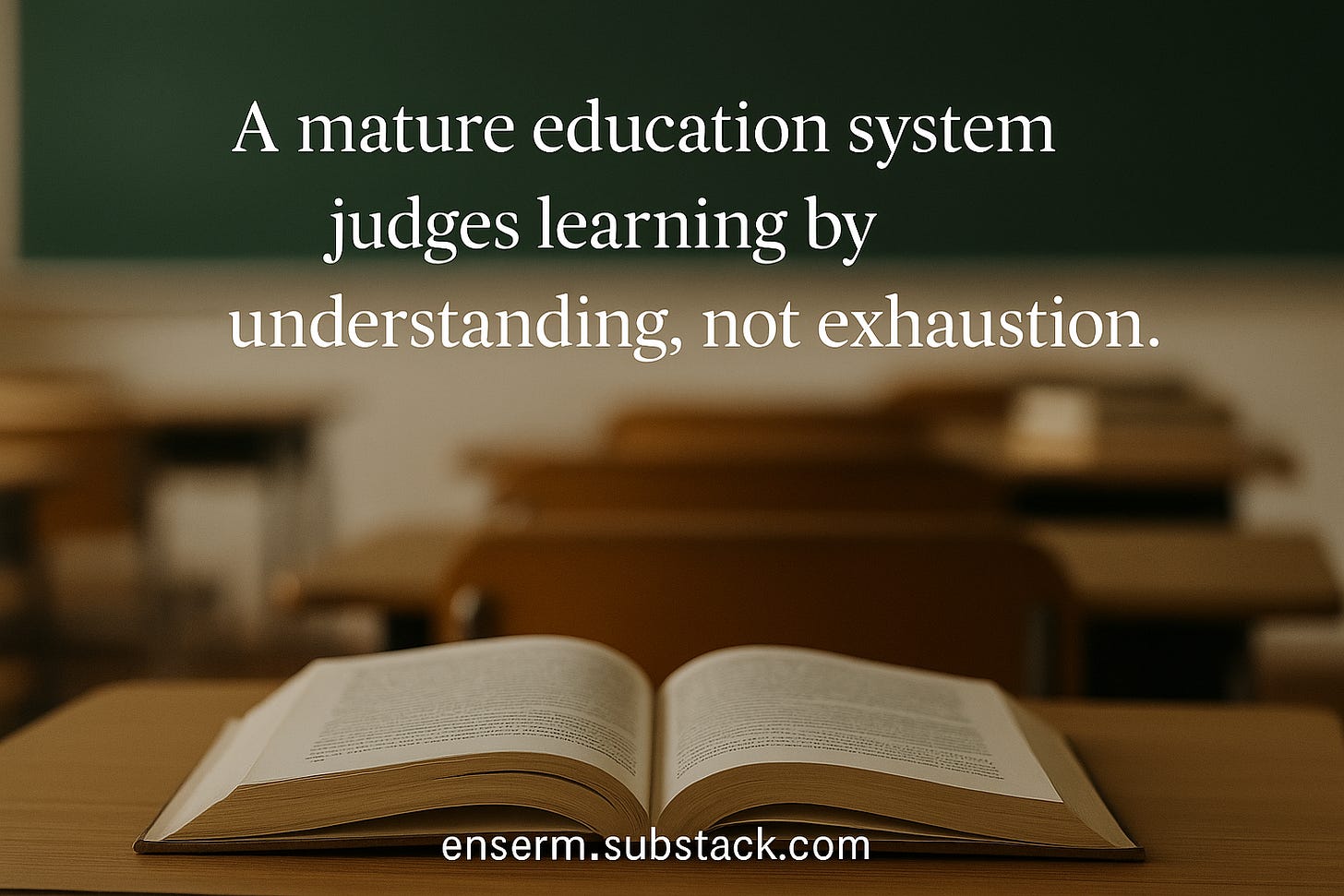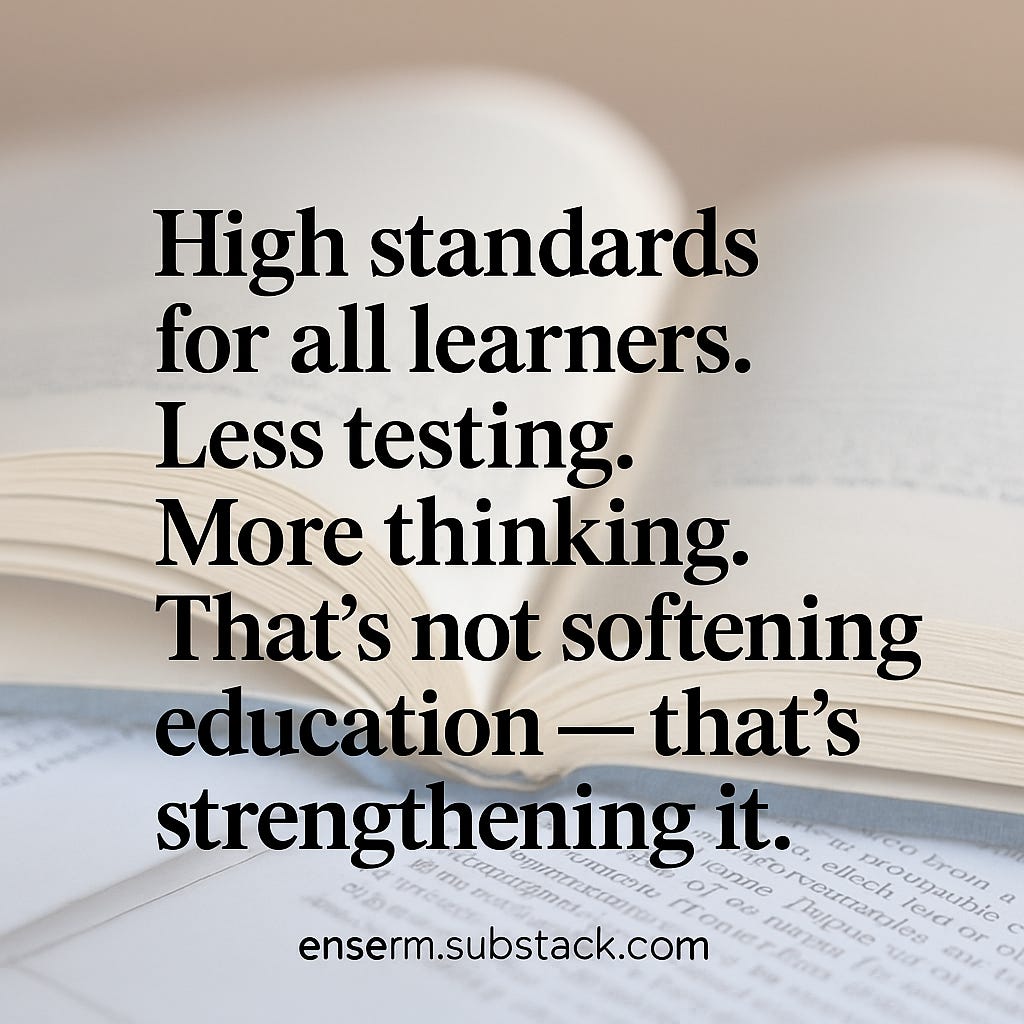Is the Curriculum and Assessment Review “Dumbing Down” Education – or Simply Redefining Rigour?
What does a mature education system set out to achieve?
When the government published the Curriculum and Assessment Review earlier this week, reactions came quickly. For some, it was a long-overdue opportunity to modernise schooling. For others, it was a dangerous step towards “dumbing down” the system.
The truth, as usual, is more complicated.
This is not the first time education reform has been accused of lowering standards, nor will it be the last. But the intensity of this response says something important about how we talk about curriculum, assessment and rigour in English education today.
What the Review actually proposes
The Curriculum and Assessment Review (Building a World-Class Curriculum for All, DfE 2025) makes a number of practical recommendations:
Reducing GCSE exam time by around 10 percent to “free more time for learning, enrichment and broader experiences.”
Removing or replacing the English Baccalaureate (EBacc) as an accountability measure.
Embedding new themes such as media and financial literacy, sustainability and misinformation across subjects.
Strengthening early diagnostic assessments and aligning testing more closely with curriculum intent.
Emphasising enrichment and practical learning as part of an entitlement for all pupils.
The report, chaired by Becky Francis CBE, is clear that its goal is evolution, not revolution. It argues that “the national curriculum remains a strength of the system” but requires “modernisation to meet the demands of a changing world.”
In other words, the Review does not propose tearing down what exists. It seeks to refine it.
The “dumbing down” narrative
Some in the media were less reassured.
Within hours of publication, headlines warned of a government “watering down” academic standards.
The Telegraph ran the headline “Labour’s dumbed-down curriculum is a betrayal of aspiration” (5 Nov 2025). The article argued that by trimming exam time and scrapping the EBacc, ministers risked “lowering expectations for working-class pupils in the name of wellbeing.”
The Sun warned that the “number of GCSE exams could be cut and lessons made more ‘diverse’ under plans blasted by MPs.”
A Yahoo News commentary suggested the Review could “intensify the lack of empathy and thought diversity… leading to an overall dumbing down of the curriculum.”
Conservative MP Neil O’Brien claimed the Review risked “hacking back the content of core academic subjects in pursuit of balance.”
The reasoning behind these arguments is straightforward.
If you reduce exam time, streamline content, and broaden enrichment, you are — so the logic goes — making education easier.
This view equates rigour with quantity: the number of exams sat, the length of papers, the amount of factual material students can recall. Anything that reduces those numbers is read as a lowering of standards.
But this is a narrow definition of rigour — and one that both the Review and many school leaders have begun to question.
What the evidence actually says
A closer reading of the Review reveals a different intent.
It does not argue for less challenge or knowledge, but for coherence, progression and inclusion. Its concern is not that pupils know too much, but that too many pupils fail to make sense of what they are taught.
“The national curriculum should ensure high standards for all learners, not only for those who already thrive within the system. Coherence, relevance and inclusivity must go hand in hand with academic rigour.”
— Curriculum and Assessment Review, p. 8
That line — high standards for all learners — is central.
The Review’s authors see reform not as a softening of expectations but as a widening of access to demanding knowledge.
Schools Week put it succinctly:
“The Review isn’t about dumbing down. It’s about levelling up — making sure that the rigour and richness of the curriculum reach every pupil, not just the most advantaged.”
In other words, the goal is to redefine rigour around depth and inclusion rather than volume and exclusion.
Why the accusation sticks
Despite these intentions, the “dumbing down” label has traction.
Reform fatigue. After decades of curriculum upheaval, any change feels like reversal.
High-stakes culture. In a system where accountability dominates, exams are equated with seriousness.
Political framing. For some commentators, academic rigour has become shorthand for traditional standards.
Trust deficit. Because the Review was commissioned by government, sceptics question motives as much as evidence.
What reducing exams could mean in practice
The proposal to reduce GCSE exam time by 10 percent has become the lightning rod for debate.
But a reduction in exam hours is not necessarily a reduction in standards.
Many high-performing systems — Finland, Singapore, Canada — assess less often but with greater depth. They focus on fewer, better-designed tasks that demand reasoning, analysis and application rather than endurance.
Writing in The Times, David Blunkett called it “a false choice between exams and wellbeing,” arguing that “a well-designed curriculum can do both — challenge pupils and protect their capacity to learn.”
If reduced exam time allows space for better teaching and deeper learning, the outcome could be higher standards, not lower ones. The danger lies in how that time is used.
Accountability, aspiration and access
Perhaps the more significant change is the proposed replacement of the EBacc.
For over a decade, this measure has shaped timetables and staffing. While it raised take-up of languages and humanities, it also narrowed opportunities for creative and technical subjects.
Removing the EBacc opens the door to a more balanced curriculum — but raises fears that some schools will again drift away from academic study.
This tension between aspiration and autonomy is at the heart of the debate. If schools interpret flexibility as permission to lower expectations, outcomes will diverge further. If they use it to craft coherent, knowledge-rich pathways suited to their context, standards could rise.
Rethinking what we mean by rigour
Rigour is not about how much students are tested but how well they understand.
It is not about how many topics appear in a syllabus but how clearly they are connected.
It is not about how hard something feels but how deeply it builds knowledge and skill.
The most rigorous learning happens when pupils grapple with complex ideas, apply them in new contexts, and reflect on their reasoning. That requires thoughtful curriculum design and skilful teaching — not simply longer exams.
What leaders should focus on now
For senior leaders and trust executives, the challenge is to separate political noise from practical next steps.
Audit curriculum coherence. Review how knowledge builds over time. A slimmer curriculum can be more rigorous.
Clarify intent and entitlement. Define what every pupil should learn and experience.
Strengthen assessment literacy. If national exams become lighter, internal assessment must become smarter.
Guard against low expectations. Freedom from the EBacc must not mean freedom from challenge.
Communicate clearly. Be ready to explain your principles: coherence, progression, inclusion and high standards.
Beyond the headlines
The “dumbing down” claim reflects genuine concern for excellence but risks missing the bigger picture. The Review does not abolish exams, dilute subjects or abandon knowledge. It redefines what rigour should mean in a system that wants both excellence and equity.
As Blunkett wrote, “we need to stop seeing exams and wellbeing, rigour and inclusion, as opposites.” The real challenge is to design a curriculum that does both — demanding, purposeful, humane.
If schools use this reform moment well, they can move away from measuring learning by exhaustion and towards judging it by understanding.
That is not dumbing down. That is what a mature education system should look like.
Sources:
Curriculum and Assessment Review (DFE 2025) • Government Response (2025) • The Guardian • The Telegraph • The Sun • Yahoo News UK • Neil O’Brien Substack • Schools Week • The Times



